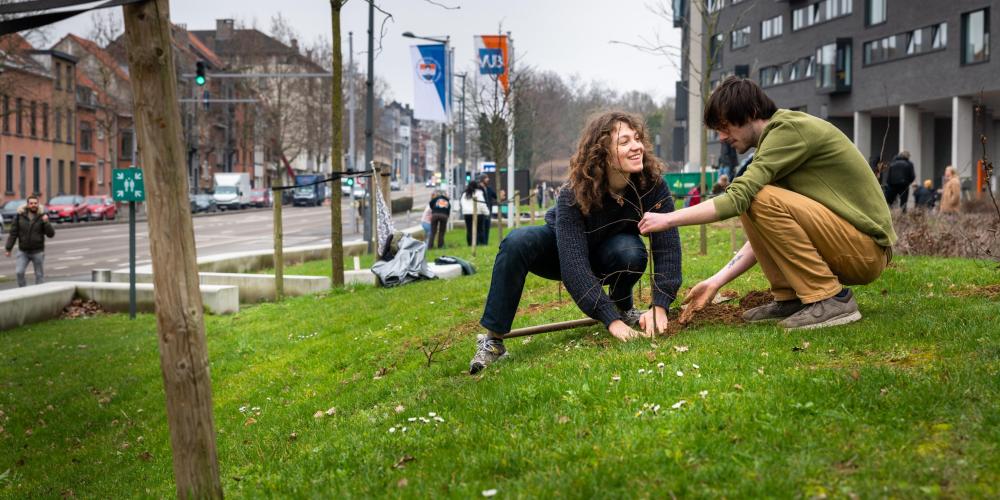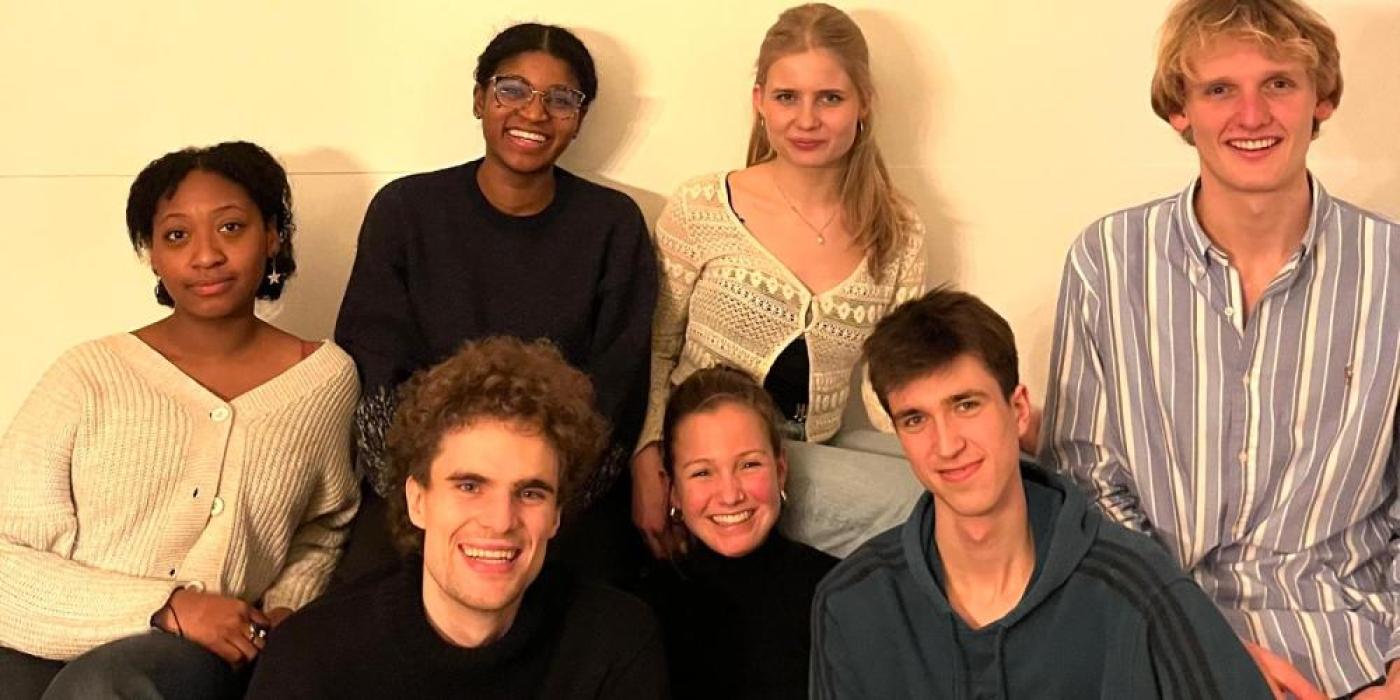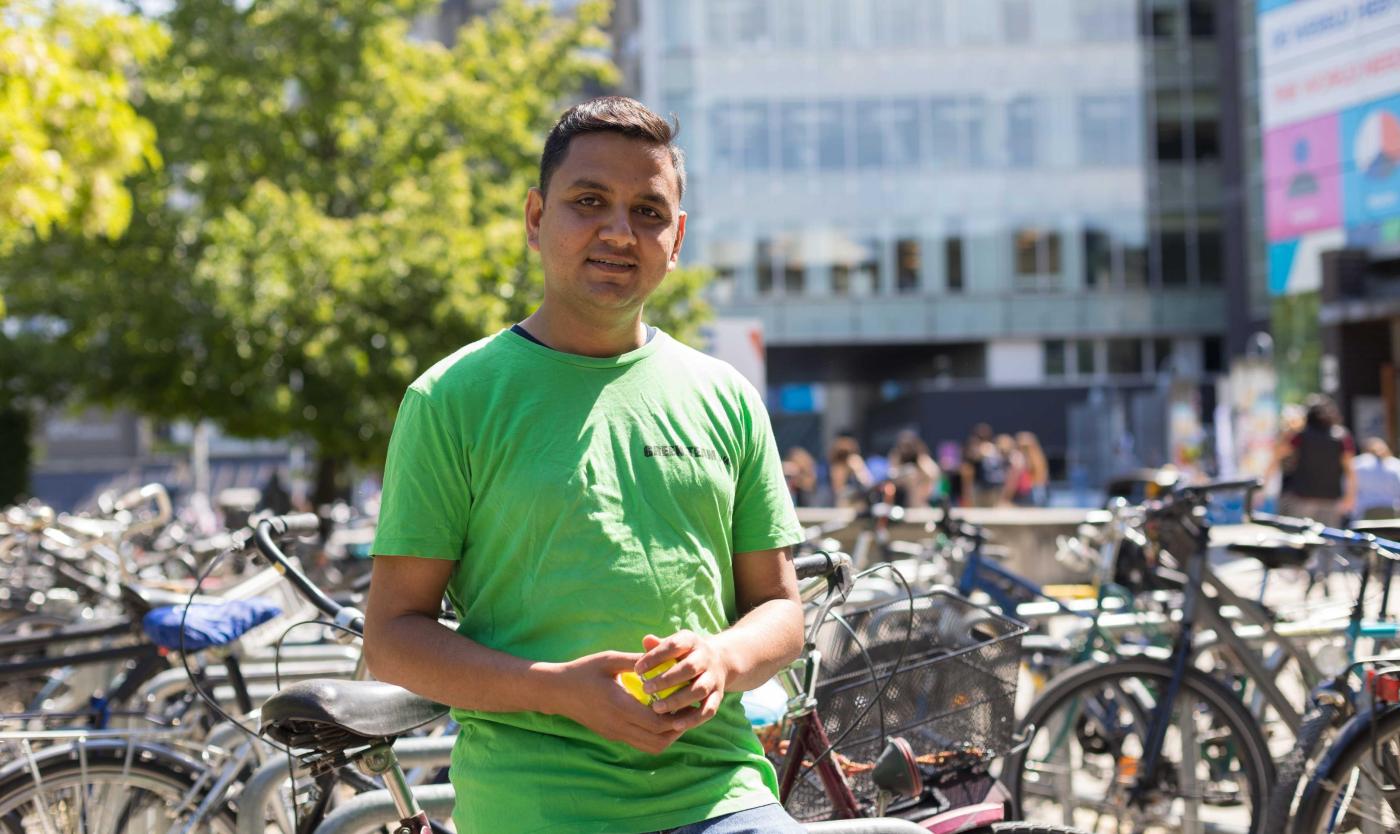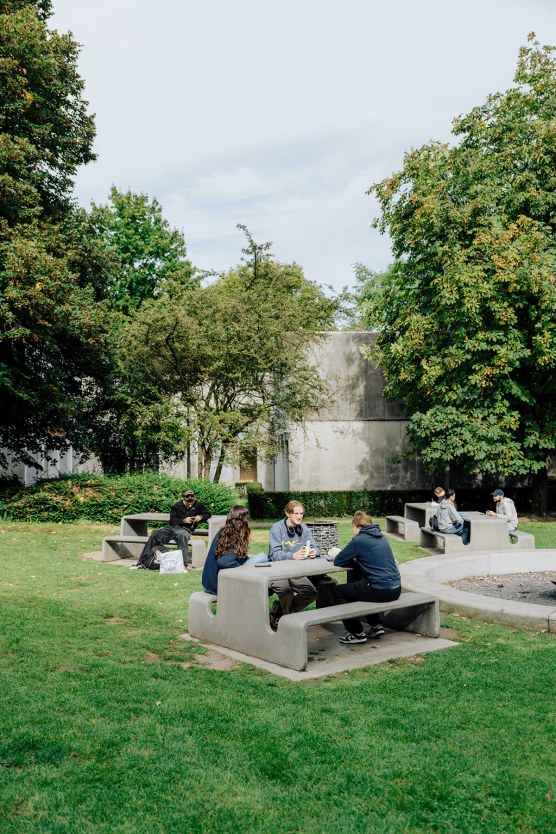
GreenTeam is marking its 10th anniversary—a milestone worthy not only of congratulations but also of a detailed interview. Coordinator Maarten Ipers has been involved since 2017, while Geography student Daan Vandenberghe, now in his third year, has been working as a student employee for just as long. They speak passionately and with great optimism about their commitment to a more sustainable VUB—and a more sustainable world.
How did GreenTeam get started?
Maarten: "Ten years ago, the then sustainability coordinator, Rebecca Lefevere, submitted a proposal to establish a fully-fledged Green Office at VUB, inspired by the model at Maastricht University. The concept originally came from the UK, and we’re still part of the umbrella organisation Green Office Movement. We meet online every month, and once a year, there’s also a Belgian gathering. We don’t want to lecture people, but by, for example, cooking vegan meals together, we can show them that it can be delicious too."
GreenTeam is made up of you and a group of students. How do you encourage them to get involved?
Maarten: "At the end of the academic year, we start looking for new students, and that usually goes quite smoothly. We’ve built a community within VUB through the activities we organise. When we announce that we have student job openings for the upcoming academic year, we receive more applications than we have positions available. From those, I select the most engaged students."
"We don't want to point fingers, but by cooking vegan together, for example, we want to show people that that can be tasty too."
And what exactly does your role involve, Daan?
Daan: "It includes various aspects, and that’s what I love most about it. We don’t just work on policy; we also get the chance to organise tangible initiatives, like a vintage market or a film night. Those are more accessible activities, but we also tackle larger topics, such as energy. Our goal is to make sustainability more relatable for students, and we do that in a positive way. We don’t want to lecture people, but by, for example, cooking vegan meals together, we can show them that it can be delicious too.
Another key part of the job is running campaigns and raising awareness. We act as a bridge between VUB’s sustainability policies and student-led initiatives."*
"It’s the best student job I’ve ever had. I feel like I’m doing something meaningful and making a real difference."

GreenTeam with Daan at the bottom right of the photo
Are students receptive to your campaigns and activities?
Daan: "I think they’re generally open to listening. Some groups are easier to reach than others, but we’ve noticed that many students at this university are keen to try something new. It’s important to keep the message positive—rather than just pointing out what’s wrong with the world, we focus on how we can move towards a climate-neutral future. I see a lot of enthusiasm."
Is the daily vegan spaghetti in the university canteen thanks to GreenTeam?
Maarten: "That’s more of an initiative from the canteen itself, but we’ve worked closely together over the years to create the sustainable restaurant it is today. Our partnership is one of the longest-running at VUB, and we were early advocates for plant-based meals. We jointly decided to participate in the Good Food Resto label, which sets standards such as offering smaller, well-balanced portions and working towards zero waste and minimal food waste."
The menu now also includes a colour-coded system for meals.
Maarten: "Yes, it’s a clear way to indicate a meal’s environmental impact without overwhelming people with too much information. The initiative, called Ecotarian, was developed by PhD researcher Lise Vermeersch, who calculates the impact and assigns the colour code. We also try to organise lectures or share information to explain why these choices matter, so students who want in-depth details can access them."
Do these events attract a lot of interest?
Maarten: "Yes, they do. Recently, we held a food talk on veganism with a speaker who founded ProVeg (formerly EVA vzw), and 50 people attended. These events are open to everyone, but we primarily promote them through VUB channels. However, we also collaborate with external organisations that share them within their networks. For events like the annual bicycle flea market, most attendees actually come from outside VUB—mainly people from the local community."
"At some other universities, budget cuts have led to downsizing Green Offices—but fortunately, not here"
You often promote cycling and public transport. How do you influence mobility policy?
Maarten: "We work to improve cycling safety in Brussels by distributing high-visibility vests and cycling maps. Through our Sustainable Travel brochure, we encourage students to take the train more often when travelling within Europe. We share this message on our own platforms with fun promotional campaigns, but we also collaborate with partners like IRMO to reach exchange students."
How Has Sustainability Evolved at VUB?
Maarten: "Among students, we see that most of them are on board with sustainability and are much less likely to question its impact on the climate. We also collaborate with many VUB departments, and most leadership teams are eager to contribute. For example, the Infrastructure department works alongside biologists and hydrologists to make the campus more sustainable by reducing paved surfaces, increasing biodiversity, and improving water management."
"With the new CIO, Karin Voets, we’ll be running a campaign for Digital Cleanup Day in March. She was immediately enthusiastic and came up with concrete proposals. We also reached out to VUB’s CAVA archive for their input on how to clean up OneDrive accounts, for example. Together with them, our sustainability policy officer, Kato Thibaut, and other key figures, we’re setting up a campaign featuring lectures, actions, and projects. Our aim is to connect different parts of the university—bringing together researchers, departments, leadership teams, and students. That’s one of the most rewarding aspects of our work."

"At some other universities, budget cuts have led to downsizing Green Offices—but fortunately, not here. We contribute to making VUB more sustainable, spark change, and bring people together. There’s a strong link between sustainable research and researchers sharing their knowledge with students. And for the students in GreenTeam, it’s not only financially beneficial but also a valuable learning experience. One of the best aspects of this student job is the skills they develop here—understanding how an organisation functions, learning how to communicate effectively, and working as part of a team."
And gaining insight into how a university operates.
Daan: "Yes, it’s really interesting to learn about that. But it can also be quite complex to understand where and how certain decisions are made. It’s sometimes difficult to influence policies because each department operates independently. Finding the right approach can be challenging, which is why having a coordinator is so important. If GreenTeam were made up only of students, things would be a lot more chaotic. Thanks to Maarten’s experience, we can learn from past efforts and know exactly who to approach for different issues."
"We need to more clearly present ourselves as a sustainable university that wants to look for solutions to become climate neutral"
What Are Your Goals for the Future? What Needs to Happen at VUB?
Daan: "Striving for climate neutrality. As a university, we have a leading role to play. Of course, we don’t operate in a vacuum—we rely on funding—but we need to position ourselves more clearly as a sustainable university that actively seeks solutions to become climate neutral. Many departments are already working on this, but I think we need to step up our efforts. Collaboration is key to making real progress, including with students, and I believe GreenTeam can be the vital link between different levels within the university."
"We’ve launched the Green Heroes programme across various departments and faculties. It’s a challenge where participants complete five sustainability actions per month to make their work practices more eco-friendly. For instance, VUB has a high energy consumption—even at night when no one is around. Departments need to work together to identify these energy drains. Another example: if you have a freezer in your office, do you really need it? And if so, is it set to the right temperature? People often turn the heating up, and then someone else opens a window. Since they don’t directly feel the cost, you need to create incentives to encourage sustainable behaviour."
What About AI’s High Energy Consumption?
Maarten: "That will be the theme for Green Heroes in March: using AI responsibly. It’s the same principle as travel—we’re not saying you should never take a flight again, but just think carefully about whether it’s the best option for your journey."

Has Sustainability Always Been Important to You?
Maarten: "The first time I became really aware of it was when I watched An Inconvenient Truth by Al Gore. That was a real eye-opener. Since then, I’ve made conscious choices that have an impact—especially in terms of food, transport, and consumption."
Daan: "During the climate marches, I started a climate action group at my secondary school. That was when I realised I wanted to do more and work with others to make a difference. I see the same drive in the other students who work here—we’re action-oriented and want to make things happen. It’s also a way for students to avoid falling into fatalism. I attended the climate conference, and to be honest, that wasn’t encouraging—but being part of this initiative gives me ‘active hope.’"
Maarten: "It’s not just about minimising your negative impact; it’s also about creating a positive one. It’s about bringing people together—both inside and outside the university. We always aim to be constructive, focusing on working towards solutions rather than pointing fingers."
"As a university, you have the opportunity to reach a large audience of tomorrow's leaders"
Should Sustainability Be a Mandatory Subject for All Students?
Maarten: "Yes, or at least it should be integrated into existing courses. Professor Cathy Macharis already incorporates it into economics programmes, but it could be embedded across all disciplines."
Daan: "It’s important to teach people about the challenges and opportunities related to sustainability within their own fields. Psychologists need to understand behaviour change, IT specialists should consider the impact of AI, engineers must design climate-resilient infrastructure… Even those who have already graduated need to continue developing the right skills."
After the 2024 elections, many were frustrated that the greener parties performed poorly. How do you deal with the political aspect of sustainability?
Maarten: "We often engage with an audience that already supports sustainability, but a university offers so many opportunities to reach a wider range of people. Incorporating sustainability into education in a meaningful way can have a major impact. Universities have a unique position to shape the leaders of tomorrow."
Daan: "If anything, it’s a reason to keep going. Our work still matters, and we have to keep spreading that message. On one hand, by making VUB itself a more sustainable institution, and on the other, by using our role as a knowledge centre to create a positive impact in education and research. If you ask what more VUB can do—that’s the answer."
Keep spreading that message. Thank you for your dedication!*
*This is a machine translation. We apologise for any inaccuracies.
Want to know more about sustainability at VUB?
Visit the GreenTeam webpage. Want to roll up your sleeves and get involved? Join us for tree planting on 6 March in Etterbeek and 10 March in Jette. In Etterbeek, we’ll also be removing paving stones to make space for more greenery. And all through March, VUB is taking part in the Veggie Challenge!

